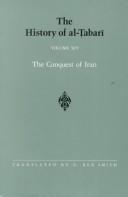| Listing 1 - 5 of 5 |
Sort by
|
Book
Year: 2005 Publisher: Bayrūt : al-Dār al-ʻArabīyah lil-Mawsūʻāt,
Abstract | Keywords | Export | Availability | Bookmark
 Loading...
Loading...Choose an application
- Reference Manager
- EndNote
- RefWorks (Direct export to RefWorks)
Arabes --- Califs --- Généalogie --- Empire islamique --- Abbassides (dynastie) --- Arabes --- Califs --- Généalogie --- Ouvrages avant 1800 --- Empire islamique --- Ouvrages avant 1800
Book
ISBN: 0585070873 9780585070872 Year: 2000 Publisher: Project Gutenberg ; NetLibrary
Abstract | Keywords | Export | Availability | Bookmark
 Loading...
Loading...Choose an application
- Reference Manager
- EndNote
- RefWorks (Direct export to RefWorks)
Caliphs --- Califs --- Khalifs --- Heads of state --- Kings and rulers --- Caliphate --- Arab countries
Book
ISBN: 9780231150828 9780231521659 0231521650 0231150822 1280599065 9786613628893 Year: 2010 Publisher: New York, NY
Abstract | Keywords | Export | Availability | Bookmark
 Loading...
Loading...Choose an application
- Reference Manager
- EndNote
- RefWorks (Direct export to RefWorks)
The story of the succession to the Prophet Muhammad and the rise of the Rashidun Caliphate (632-661 AD) is familiar to historians from the political histories of medieval Islam, which treat it as a factual account. The story also informs the competing perspectives of Sunni and Shi'i Islam, which read into it the legitimacy of their claims. Yet while descriptive and varied, these approaches have long excluded a third reading, which views the conflict over the succession to the Prophet as a parable. From this vantage point, the motives, sayings, and actions of the protagonists reveal profound links to previous texts, not to mention a surprising irony regarding political and religious issues.In a controversial break from previous historiography, Tayeb El-Hibri privileges the literary and artistic triumphs of the medieval Islamic chronicles and maps the origins of Islamic political and religious orthodoxy. Considering the patterns and themes of these unified narratives, including the problem of measuring personal qualification according to religious merit, nobility, and skills in government, El-Hibri offers an insightful critique of both early and contemporary Islam and the concerns of legitimacy shadowing various rulers. In building an argument for reading the texts as parabolic commentary, he also highlights the Islamic reinterpretation of biblical traditions, both by Qur'anic exegesis and historical composition.
Caliphs --- Caliphate --- Prophets --- Islam and politics --- Islamic parables --- Historiography --- Historians --- Historiography. --- History. --- Political aspects --- Islamic Empire --- History --- Historiographers --- Scholars --- Historical criticism --- Authorship --- Muslim parables --- Parables, Islamic --- Parables, Muslim --- Parables --- Islam --- Politics and Islam --- Political science --- Minor prophets --- Prophethood --- Seers --- Persons --- Khalifat --- Khilāfah --- Khilafat --- Kings and rulers --- Califs --- Khalifs --- Heads of state --- Criticism --- Arab countries --- Arab Empire --- Empire, Islamic --- Middle East --- Muslim Empire
Book
ISBN: 9781316855669 131685566X 9781107182011 1107182018 9781316861530 1316861538 9781316633090 1316859258 1316859630 1316860019 1316860396 1316633098 1316856976 Year: 2017 Publisher: Cambridge Cambridge University Press
Abstract | Keywords | Export | Availability | Bookmark
 Loading...
Loading...Choose an application
- Reference Manager
- EndNote
- RefWorks (Direct export to RefWorks)
What was the relationship between government and religion in Middle Eastern history? In a world of caliphs, sultans, and judges, who exercised political and religious authority? In this book, Ali Humayun Akhtar investigates debates about leadership that involved ruling circles and scholars of jurisprudence and theology. At the heart of this story is a medieval rivalry between three caliphates: the Umayyads of Cordoba, the Fatimids of Cairo, and the Abbasids of Baghdad. In a fascinating revival of Late Antique Hellenism, Aristotelian and Platonic notions of wisdom became a key component of how these caliphs debated their authority as political leaders. By tracing how these political debates impacted the theological and jurisprudential scholars and their own conception of communal guidance, Akhtar offers a new picture of premodern political authority and the connections between Western and Islamic civilizations. It will be of use to students and specialists of the premodern and modern Middle East.
Islam and politics. --- Caliphs. --- Sultans. --- Judges. --- Fatimites. --- Abbasids. --- Sufis. --- Islamic philosophy. --- Philosophy, ancient --- Politics and government. --- Religion / islam / general. --- Influence. --- Umayyad dynasty. --- Islamic Empire --- Islamic Empire. --- Alcaldes --- Cadis --- Chief justices --- Chief magistrates --- Judges --- Justices --- Magistrates --- Courts --- Kings and rulers --- Califs --- Khalifs --- Heads of state --- Caliphate --- Islam --- Politics and Islam --- Political science --- Legal status, laws, etc. --- Officials and employees --- Political aspects --- Philosophy, Ancient --- Ancient philosophy --- Greek philosophy --- Philosophy, Greek --- Philosophy, Roman --- Roman philosophy --- Arabic philosophy --- Muslim philosophy --- Philosophy, Islamic --- Philosophy, Arab --- Sufism --- Caliphs --- Ismailites

ISBN: 0791412946 0791412938 Year: 1994 Publisher: Albany State university of New York press
Abstract | Keywords | Export | Availability | Bookmark
 Loading...
Loading...Choose an application
- Reference Manager
- EndNote
- RefWorks (Direct export to RefWorks)
Caliphs --- Biography. --- ʻUmar ibn al-Khaṭṭāb, --- Iran --- Islamic Empire --- History --- ʻUmar ibn al-Khaṭṭāb, --- -Califs --- Khalifs --- 'Umar ibn al-Khattab Caliph --- Biography --- Farooq, Omar, --- Farooque, --- Fārūq-i Aʻẓam, --- Fārūq, ʻUmar, --- Omar Farooq, --- ʻOmar --- ʻOmar ibn al-Khaṭṭāb, --- Ömer, --- ʻUmar b. al-Ḫaṭṭāb, --- ʻUmar Fārūq, --- ʻUmar --- ʻUmar ibn ʻAbdulʻazīz, --- ʻUmar ibn al-H̲aṭṭāb, --- Umar ibn Khattob, --- Umar ibni Abdulaziz, --- أمير المؤمنين أبو حفص عمر بن الخطاب --- عمر ابن الخطاب، --- عمر بن الخطاب --- عمر بن الخطاب، --- عمر فاروق، --- ʻUmar bin K̲h̲at̤t̤āb, --- عمر بن خطّاب، --- فاروق اعظم،
| Listing 1 - 5 of 5 |
Sort by
|

 Search
Search Feedback
Feedback About UniCat
About UniCat  Help
Help News
News